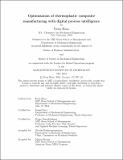Optimization of thermoplastic composite manufacturing with digital process intelligence
Author(s)
Haas, Evan
DownloadThesis PDF (18.47Mb)
Advisor
Frey, Daniel
Ramakrishnan, Rama
Terms of use
Metadata
Show full item recordAbstract
Thermoplastic composites are gaining traction in industries such as aerospace and automotive due to their mechanical toughness, recyclability, and scalable manufacturing. However, the relative nascency of thermoplastic composites and their complex production means optimal manufacturing parameters are not well characterized. Processes are often developed through trial-and-error with limited understanding of the underlying drivers of material behavior, reducing yields and stretching development timelines. This work describes a digital intelligence infrastructure built to close this knowledge gap with high-resolution manufacturing data collection. This inexpensive system, comprised of a series of Programmable Logic Controller (PLC)s, Raspberry Pi-based telemetry units, and SQL database, captures high resolution data across hundreds of shop-floor sensors. Since this effort began, scrap rates for the targeted product dropped 85%. We also describe experiments probing composites behavior during thermoforming; by monitoring parameters including pressure, temperature, cooling rate, and dimensions, the production process is characterized and controlled. A Design of Experiments (DOE) based on this platform identified temperature as the determining factor of outcome quality. Furthermore, controlling temperature by closing the loop with current sensors and infrared imaging effectively sustained high quality. Lastly, we describe the early stages of a digitally-informed New Product Development (NPD) process to reduce development times using data from this system.
Date issued
2024-05Department
Massachusetts Institute of Technology. Department of Mechanical Engineering; Sloan School of ManagementPublisher
Massachusetts Institute of Technology